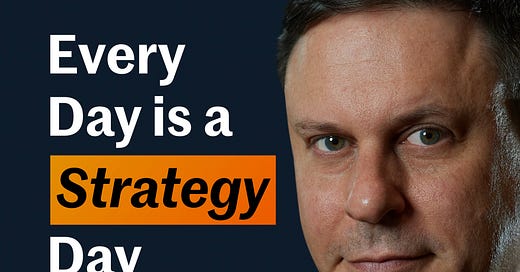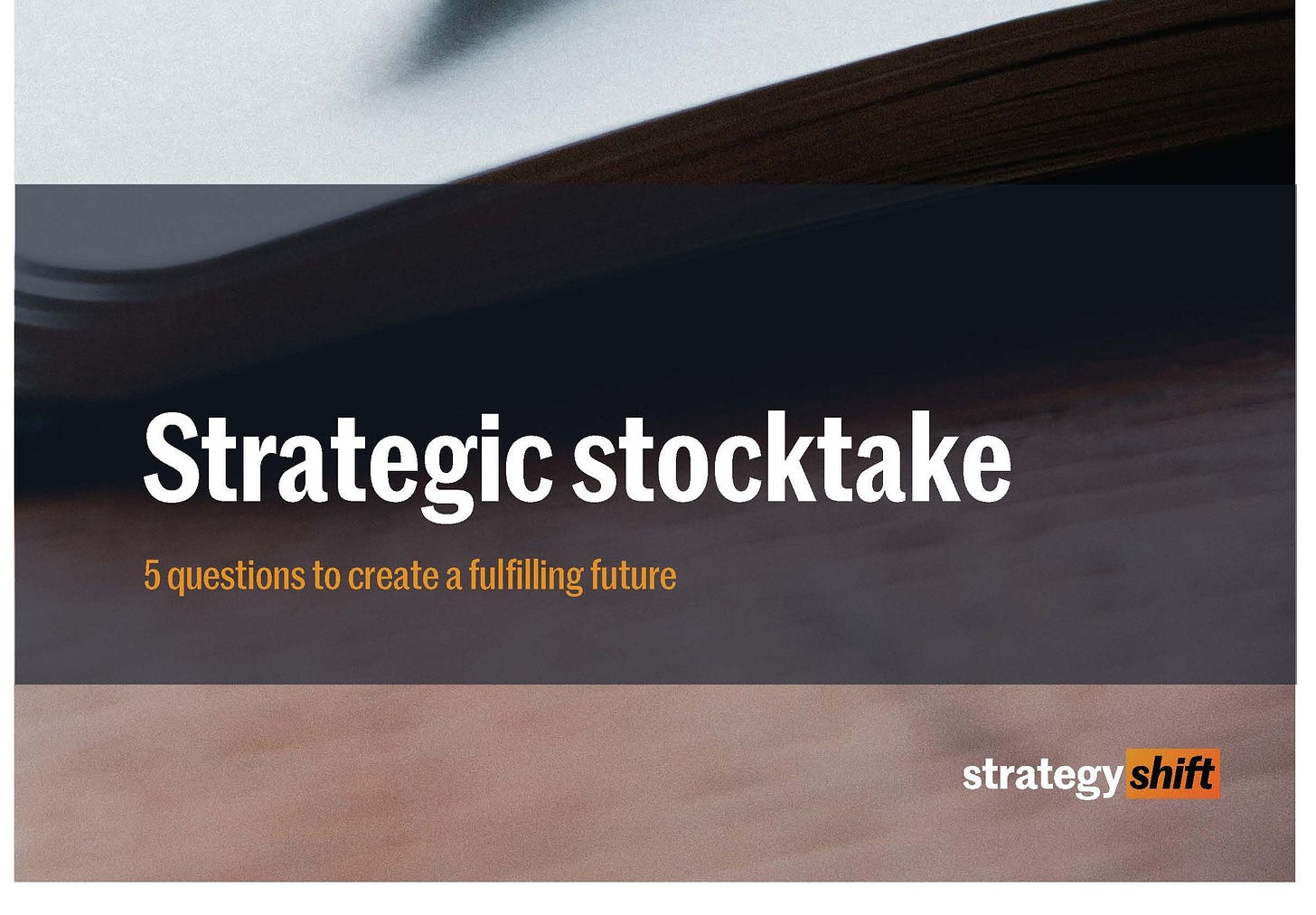Think.
I used to think that reflection was an indulgence. Something that was probably good for me but felt like a distraction from what I should be doing – which was to be marching forward, at pace, doing as much as possible.
That’s how many of us are encouraged, if not incentivised, at work. Impact is disproportionately determined by the hours work, the intensity etched on our face, and our visibility in front of our bosses and colleagues.
For sure, we might do a post-project review. We identify improvements and give each other feedback. But do we really dig into what we could have done to have transformed the result or made the way we did far more enjoyable?
We don’t. Often it’s superficial. A tick-box exercise.
The same goes for us, as individuals. Yes, I practise gratitude, noting down people or moments that I’ve been most grateful for. It gives me a boost and centres me.
But reflection requires more – more time, more focus, more inquiry about yourself and those around you.
It’s only then do we discover:
What impact we truly had on others.
What choices we made.
What we most enjoyed.
What we’re learning.
What we’re missing.
What we need to take a step – or leap – forward.
It’s especially important to reflect at critical moments in your life, positive or not - when you landed a new role, or you missed out on a new promotion, or when you faced a major life event.
Think about this for a moment. Consider how much time you spend establishing a new initiative – formulating the idea, testing it with others, mobilising a team, pitching it for investment. It takes days and days of effort, if not more, right?
Now, ask yourself how much time do you spend reflecting on a critical moment in your life. Or every week.
Surely you could take 1 hour of 168 hours per week to reflect?
It’s remarkable how every single executive I work with tells me they get the power of reflection. ‘Tell me something new, David’, I sense them feeling.
Yet their schedule, yes we look at it, suggests they only do it sporadically or on vacation. What a missed opportunity!
Reflection, often overlooked in our pursuit of success, is not just a practice; it’s a superpower. It enables all of us to learn from their experiences, align our actions with their values, and make better decisions in the face of uncertainty and complexity.
So, what will you do make it an intentional, consistent practice (like going for coffee, going to the gym, enjoying a favourite food)?
Listen.
My discussion with Luis Velasquez for my Lancefield on the Line podcast focused on the power of reflection and intentional acts in nurturing resilience, rather than thinking of it an extraordinary trait. He shared his own journey, both as a coach and brain tumour survivor.
“Resilience is not about waiting for a crisis to act; it’s about nurturing it daily”
This is what he said:
Be clear on what resilience means. It’s “the process of adapting and thriving, not just surviving.” It’s embedded in our DNA and doesn’t require a life-altering event to access. Instead, it involves unlocking our natural ability to grow and adapt through daily habits and intentionality.
Work on finding acceptance: “This is where we are. This is the moment we’re meant to be in.” It doesn’t mean giving up; it creates the clarity needed to move forward. For Luis, acceptance came when he reframed his identity post-brain tumour diagnosis, shifting from dealing his losses to embracing his new self.
Reframe limitations into possibilities. Even “doing nothing is a choice.” Recognising our choices—even when they feel constrained—empowers us to take intentional action.
Fear Less, Don’t Be Fearless: Resilience is not about eliminating fear but about gradually expanding your comfort zone: “The resilient journey is about safe, incremental steps that build momentum.” Start small, take manageable risks, and watch your confidence grow.
Be intentional with your relationships: Luis categorises relationships into five types: mentors, mentees, competitors, partners, and sponsors. He advises us to nurture these intentionally, as they form a “social resilience” network that supports personal and professional growth.
Find a deeper purpose. Luis credits his survival during his darkest moments to finding a purpose greater than himself. The thought of his mother’s suffering stopped him from ending his life, and his children became his guiding purpose in later years.
You can watch the episode here:
Visualise.
I bet we prepare well for our most important conversations, pitches, and meetings. How to master the small talk, create a strong first impression, and present convincingly. I also bet that we rush off after we finished; we might debrief with ourselves or with colleagues but do we capture all of the learning?
In my work with executives, I often ask what they learned about themselves, the Exec team or Board, the strategy, the specific decision they made. At first, they talk about actions and some of the dynamics between people. Then they dive deeper, drawing out lessons and insights that help them follow up with greater clarity and confidence.
So, I encourage you to use the canvas I’ve created. You can download it here (call it an early Christmas present!).
Schedule some time after the session and start capturing; give it a day and do it again. I bet you’ll find some gems - then use the insight wisely as you make your next move.
Read.
I’m a big fan of Arthur Brooks. This article in the Atlantic is an excerpt from his book From Strength to Strength: Finding Success, Happiness, and Deep Purpose in the Second Half of Life. It really spoke to me about reflection about what matters to us.
Satisfaction = what you have/ what you want
“All of our evolutionary and biological imperatives focus us on increasing the numerator—our haves. But the more significant action is in the denominator—our wants…
The secret to satisfaction is not to increase our haves—that will never work (or at least, it will never last). That is the treadmill formula, not the satisfaction formula. The secret is to manage our wants. By managing what we want instead of what we have, we give ourselves a chance to lead more satisfied lives.”
Challenge yourself.
Pick a time, find a place, select a pen. Do a Strategic stocktake of yourself as you reach the end of the year using this document I’ve created.
Answer these five questions:
1. What impact did you have on the world around you?
2. What choices did you make?
3. What did you learn?
4. What resources did you use?
5. What held you back?
Use the answers to consider where you will go next. Consider: What excites you the most? What do you need to put in place to make it happen? What (and whom) will you need to leave behind? And at your boldest and best, what impact do you want to have next year?
Strategy Shift.
I’m finishing up the work year shortly, ready for our family holiday to Vietnam; we take our longer holiday in the winter to get some sun. I’m looking forward to exploring a new country.
I’ll be back in the New Year with new energy and fresh determination – to develop thousands of people become more intentional with their lives, rising above busyness to transform their impact. Strategic people, I call them.
That’s all for this edition and for this year. Thanks for subscribing and for your interest, encouragement, and inspiration.
***
That’s all for this edition. Thanks for reading Every Day is a Strategy Day!
Subscribe for free to receive new posts and support my work.






